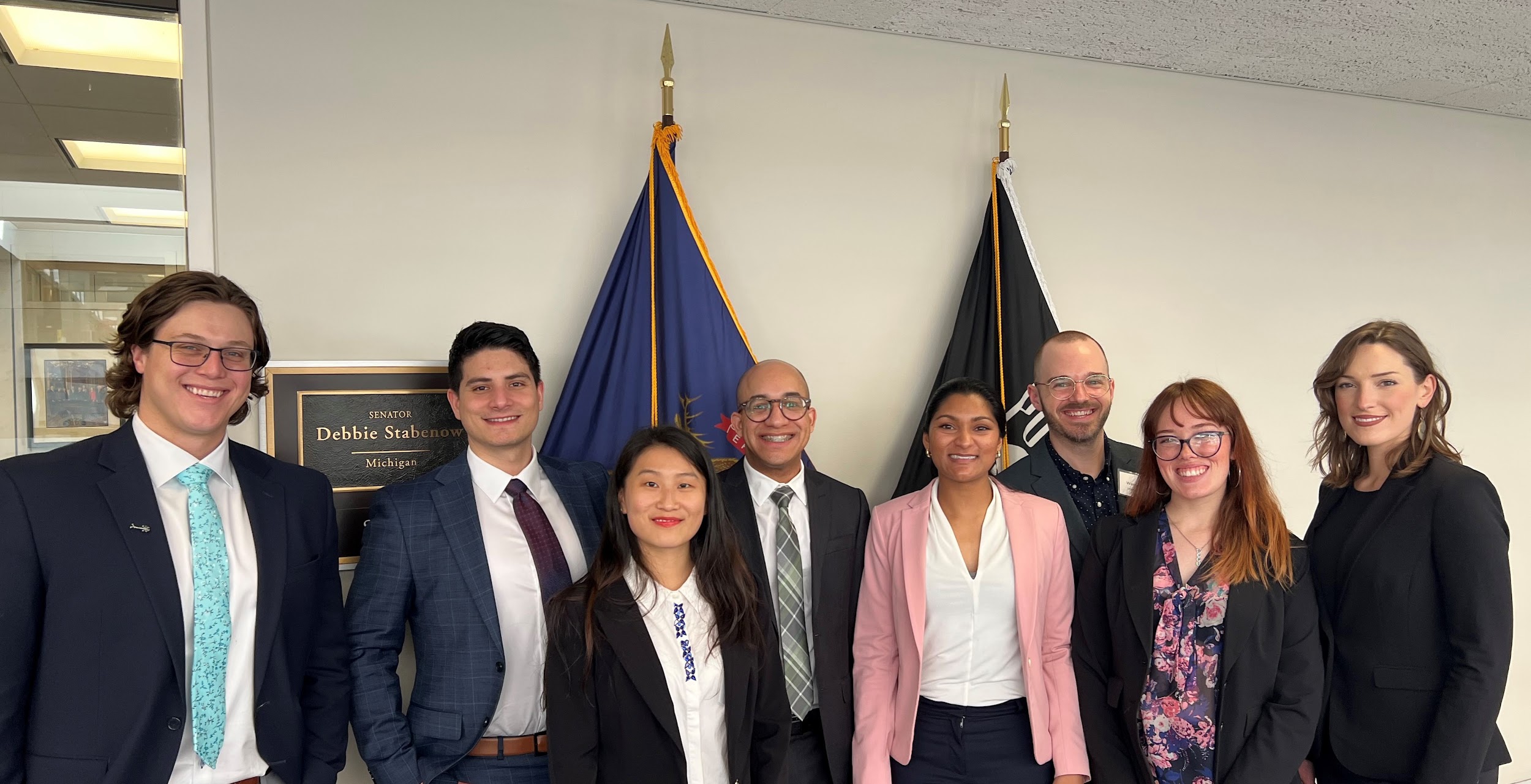Catalyzing Advocacy for Science and Engineering Workshop
Every year, Rackham selects and supports four graduate students to attend the American Association for the Advancement of Science (AAAS) Catalyzing Advocacy in Science and Engineering (CASE) workshop in Washington, D.C. Students spend two to three days learning about the structure and organization of Congress, the federal budget and appropriations process, and tools for effective science communication and civic engagement.
Rackham covers registration and all associated travel and lodging costs for the selected students. For additional details about the CASE workshop, visit the AAAS website.
Requirements
- Students must be enrolled in a graduate degree program at the University of Michigan-Ann Arbor Campus.
- Students must be in a STEM field:
- Biological, physical, or earth sciences
- Computational sciences and mathematics
- Engineering disciplines
- Medical and health sciences
- Social and behavioral sciences
- Students must be able to travel to Washington, D.C., on the program dates.
- Students will be asked to write a blog post or share their experience with Rackham staff and with others on campus in another way agreed upon at the time of acceptance.
Program Dates
April 6 to 9, 2025
Applications are due by 9:00 a.m. EST on Monday, February 17, 2025.
Student Experiences

University of Michigan and Michigan State University Students visit the office of Senator Debbie Stabenow. From left to right: Jacob Howe (MSU), Jasiel Strubbe (MSU), Lirong Shi (UM), Nolgie Oquendo-Colon (UM), Sharmila Samaroo (MSU), Warren Gunn (UM), Allison Cale (UM), Corinn Rutkoski (MSU).
Student Reflection Excerpts
2024
Emily Costa, Ph.D. Student, Chemistry
“Participating in the AAAS CASE workshop provided a great introduction to the science policy opportunities available at the federal level. We heard from speakers in a variety of roles, from federal agencies to the White House Office of Science and Technology Policy, which allowed me to envision possible future careers. AAAS staff provided helpful, concrete advice on remaining involved with science policy beyond the workshop. Networking with peers from various institutions was also valuable. I was able to hear from other graduate students about their research and its applications, most of which were very different from my own, and expanded my understanding of science policy. Finally, our visit to Capitol Hill was an excellent learning experience, as we learned to become effective advocates for our science.”
Alondra Ortiz-Ortiz, Ph.D. Student, Mechanical Engineering
“Since the first year of my Ph.D., I have been involved in diversity, equity, and inclusion initiatives, as well as received Science Communication training as part of RELATE. It was at RELATE that I discovered the power of communicating clearly with lay audiences and decided to explore science, technology, and policy opportunities as a career path after finishing my Ph.D. It was then that I decided to apply to the AAAS CASE Workshop. Being part of the 2024 AAAS CASE Workshop was a truly transformative experience. I had the opportunity to delve into the structure and organization of Congress as well as learn the difference between Policy for Science and Science for Policy. During the workshop, I had the opportunity to meet other scientists who shared the same passion I do about science and policy, and I got to work with them on a federal budget exercise that served to expose me to how financial decisions are made at the federal level and how priorities shape our society and government. The opportunity to talk with staffers and meet with Senator Gary Peters further encouraged me to pursue a career in policy. It grew my confidence that as a scientist, I can have a seat at the table.”
Zachary Sluzala, Ph.D. Student, Neuroscience
“I very much enjoyed the workshop and found it incredibly valuable for learning about science and technology policy, the budgeting processes, networking, and meeting with Hill staffers… My experiences in policy had been largely within the think tank sphere (and academic, at least in terms of the STPP certificate), so I appreciated delving into the roles of the executive and legislative branches. The budget exercise and presentations helped me better understand these roles… Overall, I think that the workshop was very valuable, and it helped me to better understand the policy processes, particularly in terms of budgeting / roles of executive & legislative branches. It also showcased the general lens through which science and tech policy are viewed by scientists and groups like AAAS and made me more aware of where I agree and disagree with those frameworks. And networking with the speakers and other students was also a great benefit.”
2023
Allison Cale, Ph.D. Student, Genetics and Genomics
“I am interested in science for policy, and something very useful that was repeatedly instilled into us was that when we as scientists are communicating scientific issues to legislators, we need to be extremely brief, avoid jargon, and contextualize the science in a way that functionally matters to the policy maker and/or their constituents. I also learned to avoid absolutist statements like, “The science says this is the right policy,” as science is ever-changing and just one facet of policy formulation—other facets include economics, personal values, public preferences, and prioritization of stakeholder interests, among many other things. We got to hear from several people with scientific backgrounds who worked within federal agencies, and it was very informative to hear their career trajectories and how science is funded and used within those agencies.”
Warren Gunn, M.S. Student, Environment and Sustainability, M.S. Student, Public Policy
“My participation in the AAAS CASE Workshop was truly transformative. It was so refreshing to be surrounded by other scientists and engineers who are equally committed to making a difference through increasing their involvement in the policy space. One concept we learned about during the workshop was this idea of, ‘Policy for science, and science for policy,’ which translates to, ‘How do we advocate for policies that support scientific research and development, and then how do we use good science to inform good policy?’ I had never thought of it in quite that way, and it has given me much on which to reflect in terms of how my work can inform both sides of that ‘policy coin.’
“Our actual Congressional visits went extremely well and really humanized the political process for me. I walked away feeling like most of our legislators, especially in Michigan, are deeply committed to adequately funding science at the federal level and devoting the resources necessary to help support the next generation of scientific research.
“Overall, this experience was incredibly empowering and enlightening, and I would encourage anyone interested in learning more about how they can use the knowledge and skills they have developed during their academic careers to help shape federal policy to apply to next year’s workshop!”
Nolgie Oquendo-Colon, Ph.D. Student, Engineering Education Research
“I attended the workshop very curious about how scientists integrate into public policy work, particularly what kind of role they play in decision making, and I understood not only the role of a scientist in the process, but also the responsibility it takes to be one.
“One of the most important elements of that role is trust. Tobin Smith said in his presentation, ‘You build trust in spoonfuls and lose it in buckets.’ American society has a high respect for the scientific community, and it is our mission to continue working with integrity and responsibility so that, in this way, we can be heard and be able to continue advancing for the good of our society.”
Lirong Shi, Ph.D. Student, Chemistry
“The AAAS CASE workshop provided a perfect opportunity for me to get exposed to real-world experiences and apply what I have learned. My favorite part of the workshop was the interactive activity of being in one of the appropriation committees in the Congress budget-making process. We were all impressed with the complexity and sheer amount of the budget that Congress has to figure out every fiscal year, let alone considering diverse perspectives and conflicting interests.
“Through a day of self-introduction and advocating for federal research funding, I found myself becoming more and more confident and fluent in introducing myself and the issues I care about to the government officials. I’m really glad to have participated in this workshop and look forward to bringing this experience into my future career.”
Contact the Program in Public Scholarship
1530 Rackham Building
915 E. Washington St.
Ann Arbor, MI 48109-1070
Email: rackpublicscholarship@umich.edu
Hours
The Program in Public Scholarship is open Monday through Friday, 8:00 a.m. to 5:00 p.m.
The office is closed Saturdays and Sundays and on the following holidays: Thanksgiving (Thursday and the following Friday), Christmas through New Year’s, Memorial Day, Independence Day (July 4), and Labor Day.

